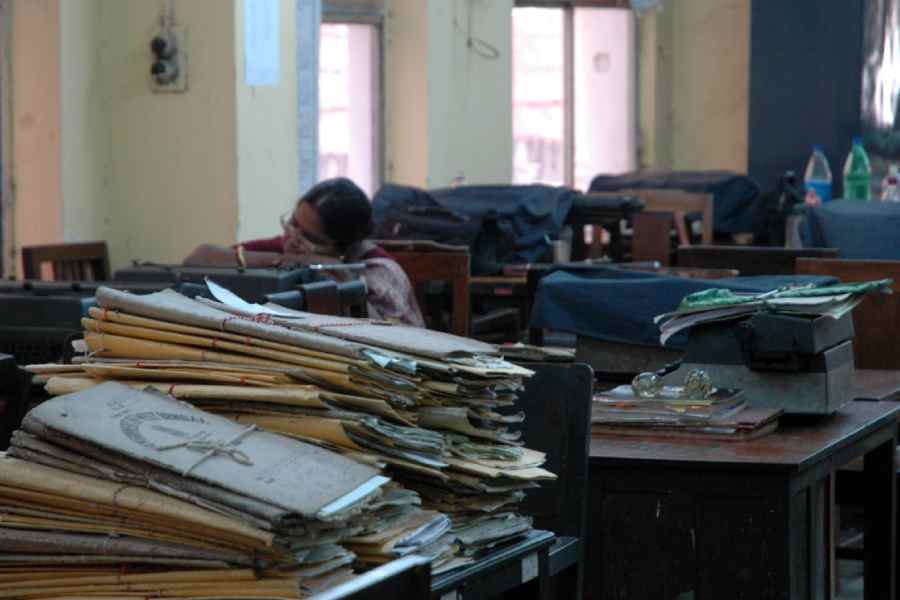Take it easy
Sir — What the Indian babu thinks today, the world discovers tomorrow. A new study by The Alan Turing Institute has predicted that Artificial Intelligence will take over about 84% of repetitive government services, such as processing passports and registering to vote, freeing up valuable time for public servants. But the sarkari babus in India do not need AI to free up their time. They have for long perfected the art of enjoying leisure time during office hours. Given that over 80% of the job of Indian government employees is to doze during office hours, perhaps they will teach AI a thing or two about taking it easy.
Naveen Kumar, Patna
Wide chasm
Sir — At a time when India’s economic development has become a talking point globally, the news of rising inequality is worrying (“Have-nots’ land”, Mar 23). A paper titled Income and Wealth Inequality in India, 1922-2023: The Rise of the Billionaire Raj produced by three economists, including Thomas Piketty, has outlined that in 2022-23, the income share of the richest 1% of the country’s population has increased to 22.6%. The wealth share of this segment has also risen by 40.1%. The fact that a majority of the wealth is concentrated in the hands of a small, privileged circle of citizens hints at a failure in policymaking. The researchers suggest a wealth tax to bridge some of this gap. If the gap continues to widen, the government’s promise of ‘sabka vikas’ is pointless.
Abhijit Roy, Jamshedpur
Sir — India has one of the highest levels of income and wealth inequality in the world. Amidst growing hunger and poverty, India has produced more billionaires than most other developed countries. The former president, Manmohan Singh, had once said that “India happens to be a rich country inhabited by very poor people.” India has now become a country of very poor people inhabited by many billionaires.
Sujit De, Calcutta
Sir — In 1949, B.R. Ambedkar had issued a grim warning that if we continue to deny social and economic inequality for long, we could “blow up the structure of political democracy”. This is evident now. The links between our social structures and income inequality and poverty must be reckoned with.
Ashok Sen, Calcutta
Change tack
Sir — The revelations about electoral bonds do not seem to be making much difference to the electorate. People have taken the connections between political parties and their financial benefactors — these have always existed — for granted. There have to be other, newer ways of busting the unholy nexus between industrialists and politicians — naming and shaming will no longer suffice.
S.S. Paul, Nadia
Softened tone
Sir — The president of the Maldives, Mohamed Muizzu, has toned down his strident anti-India rhetoric now that he needs debt relief from New Delhi (“Muizzu seeks debt relief from India”, Mar 23). The Maldives owed approximately $400.9 million to India at the end of 2023. Yet, Muizzu took a hardline stance where India is concerned ever since he was elected, demanding that New Delhi withdraw its military presence from the country. His new reconciliatory approach will undoubtedly benefit the Narendra Modi government in the upcoming Lok Sabha elections.
Bhagwan Thadani, Mumbai
Urgent threat
Sir — In the deadliest attack in Russia since the 2004 Beslan school siege, camouflaged gunmen sprayed civilians at a concert hall with bullets, killing over 133 people and injuring more than 145 (“133 slain in Moscow concert hall massacre”, Mar 24). The Islamic State has claimed responsibility for the attack. This should serve as a lesson for Russia. When the world is dealing with such threats, all resources should be dedicated to fighting them. Instead, the Russian State and army are engaged in a needless battle.
Bidyut Kumar Chatterjee, Calcutta
Medical milestone
Sir — The pioneering transplantation of a kidney from a genetically-engineered pig into an ailing 62-year-old man in Boston is a major medical feat (“Pig kidney transplanted into ailing patient”, Mar 22). If this proves to be a success, it will offer hope to millions of patients worldwide in need of kidneys. This is an occasion to remember Dhaniram Baruah, a cardiothoracic surgeon from Guwahati, who first transplanted the organs of a pig into a human body in 1997, albeit unsuccessfully.
Jahar Saha, Calcutta
Bittersweet
Sir — Amidst the deafening din of elections, Sudipta Bhattacharjee’s article, “A green spring” (Mar 22), struck a soothing note. While it is heartening that the Meghalaya government has decided to establish the Tagore Cultural Complex at Shillong’s Brookside, the news that old trees are being chopped down for this is saddening. This does a disservice to Tagore’s love for the natural world.
Sanjit Ghatak, Calcutta











